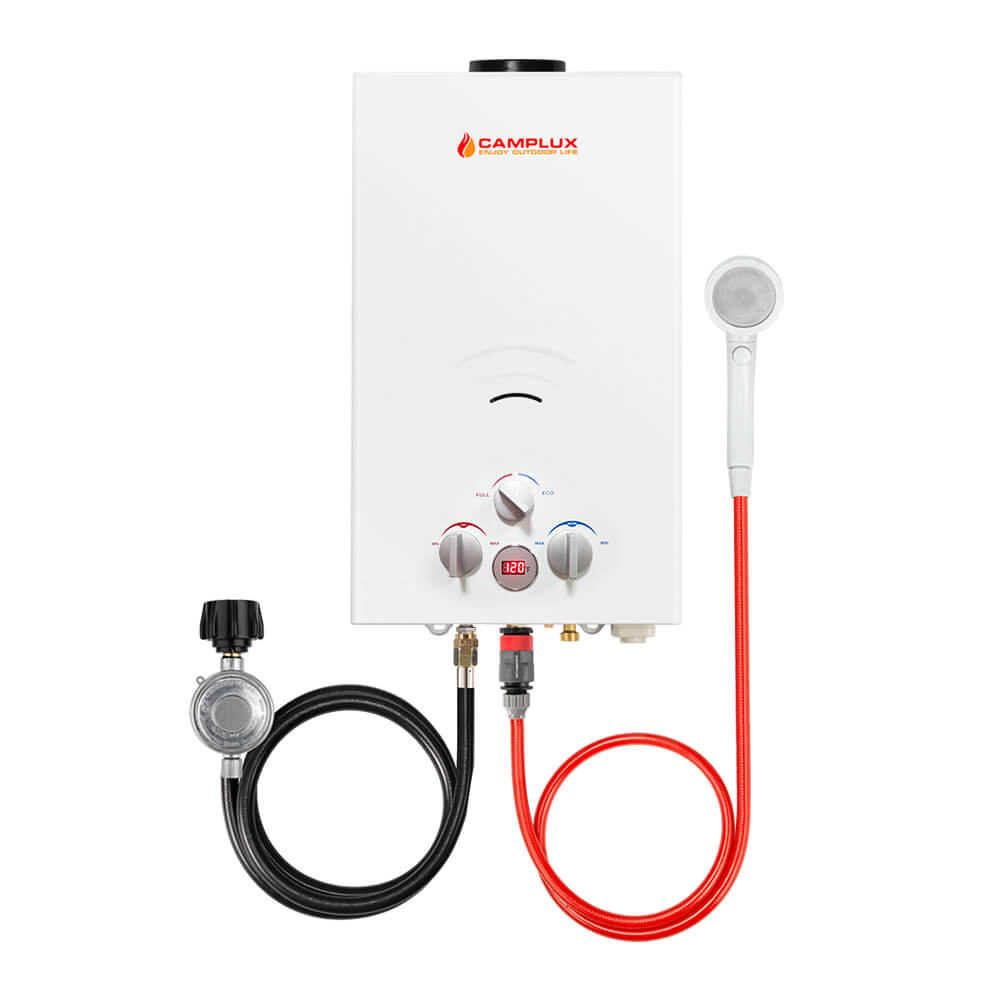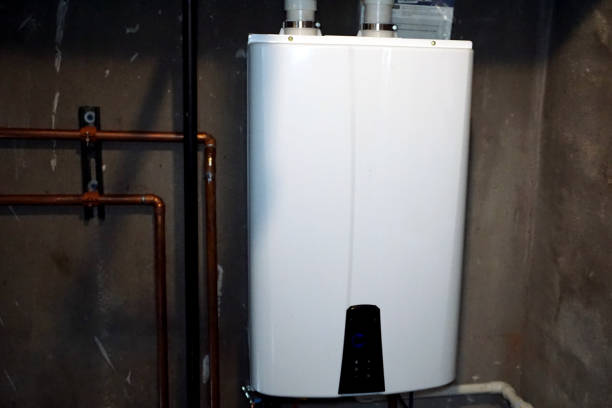Important Gains Of Adopting Tankless Water Heaters
Important Gains Of Adopting Tankless Water Heaters
Blog Article
What are your thoughts about 5 Benefits of Tankless Water Heaters?

In a world where convenience and performance reign supreme, it's no surprise that property owners are frequently in search of smarter means to manage their home's power intake and comfort. One technology that has progressively gotten popularity is the tankless hot water heater. But exactly what makes these systems attract attention from the conventional tank-based versions the majority of us matured with? Allow's dive in and explore the advantages of tankless hot water heater, helping you determine if it's time to make the button in your house.
Introduction
Picture this: you enter the shower after a lengthy day, expecting a soothing waterfall of warm water, just to be welcomed by icy beads since the last person used everything up. Sound familiar? Typical water heaters save a set quantity of hot water, suggesting you go to the grace of that storage tank's supply. Tankless systems, on the other hand, warm water as needed. No more running out mid-shower, say goodbye to fumbling with timetables just to guarantee warm water is available.
Understanding Tankless Hot Water Heater
What Are Tankless Water Heaters?
Tankless hot water heater, sometimes referred to as on-demand or immediate hot water heater, supply hot water just as it's needed. Rather than storing gallons of pre-heated water, these units kick into activity the moment you switch on the tap. Water passes through a warmth exchanger, heating up in real-time, implying you obtain a nonstop flow of warm water without the need for a large container resting lazily by.
Exactly how Do They Vary from Typical Solutions?
Traditional heaters hold a storage tank of hot water, making use of power to keep that container at a consistent temperature level. Tankless devices eliminate the standing supply, cutting down on lost power and the cumbersome footprint of a huge cylinder. Essentially, you're updating from a "stockpile" way of thinking to a "made-to-order" technique.
Common Sorts Of Tankless Devices
Tankless hot water heater generally are available in two ranges: gas and electric. Gas models tend to provide higher circulation rates, suitable for bigger families, while electric models commonly serve smaller homes and are normally easier to install. Furthermore, some systems are created for point-of-use (serving one fixture) while others can deal with the entire home's warm water requirements.
Secret Advantages of Tankless Hot Water Heater
Energy Efficiency and Cost Savings
Say goodbye to heating up a giant tank's well worth of water and maintaining it cozy all the time. Tankless heating units lower standby energy losses, which can reduce energy expenses. While the first expense might be greater, the long-term financial savings often warrant the investment.
3. Space-Saving Layout
If your home is short on storage, eliminating the bulky storage tank liberates beneficial space. Tankless units are compact and can usually be placed on wall surfaces, tucked away in edges, or mounted in limited energy wardrobes without having all to oneself the entire room.
4. Longer Lifespan
A well-kept tankless water heater can outlast its tank-based cousin. Conventional tanks could last 10-15 years, while tankless models can keep chugging along for 20 years or even more, making them a solid investment in time.
1. Limitless Hot Water Supply
Ever before needed to schedule showers so everybody gets their reasonable share of warm water? With tankless, that comes to be a distant memory. As long as the heating system's flow capability isn't exceeded, you can take back-to-back showers without developing into a popsicle.
5. Improved Water Top Quality
Storing water in a container can in some cases lead to sediment accumulation or a somewhat "off" preference. With tankless systems, fresh water is heated instantly, lowering the chances of sediment accumulation and potentially providing cleaner-tasting water.
Considerations Before Switching
Though the benefits are engaging, it's important to consider a few factors prior to totally dedicating.
Reviewing Your Home's Water Use Patterns
If your family all at once utilizes several fixtures with high hot water need, make sure the device's flow rate fulfills your requirements. Knowing your use patterns helps you select the best dimension and kind of tankless heater.
Upkeep and Treatment Tips
Tankless systems are relatively low upkeep, but they aren't set-it-and-forget-it home appliances.
Normal Cleaning and Descaling
Tough water minerals can develop in the warm exchanger, influencing efficiency. Routine descaling (frequently recommended annually) keeps the system performing at peak performance.
Yearly Specialist Examinations
A yearly checkup from a professional makes sure small problems are caught early. They'll analyze the unit's performance, look for leakages, and aid keep ideal performance.
First Financial Investment Costs
Tankless heaters usually come with a higher upfront cost. In between the unit itself and possible setup adjustments, the initial expense might offer you sticker shock. But bear in mind to see it as a long-term financial investment.
Installment Demands
Depending on your home's facilities, you could need added electrical capability or gas line upgrades. Guarantee you comprehend the installment requirements and talk to a professional to avoid surprises.
Making Sure Correct Ventilation
For gas models, appropriate air flow is vital to securely remove exhaust gases. Make certain airing vent systems are tidy and correctly installed to avoid any type of possible safety and security threats.
Contrasting Different Brands and Designs
Not all tankless hot water heater are produced equal.
Looking Into Trusted Makers
Search for reputable brands with a background of creating high quality units. A dependable manufacturer often supplies better consumer support and longer service warranties.
Setup: Do It Yourself or Expert?
While some property owners enjoy tackling projects themselves, tankless installment could not be the most effective time to break out the tool kit.
Pros and Cons of DIY Installment
A DIY set up might conserve cash, however it comes with risks. Inaccurate installment can lead to inefficiency or safety and security concerns. If you're handy and have experience, it might be viable-- yet wage care.
Checking Out Reviews and Customer Comments
Individual evaluations and comments from neighbors or good friends that have gone tankless can provide valuable understandings. Occasionally, real-life experiences can be a lot more telling than advertising and marketing pamphlets.
When to Call a Professional Plumbing
For the majority of, calling a professional ensures everything's done appropriately. An expert plumber comprehends neighborhood codes, sizing requirements, and airing vent specifications, lowering the risk of incidents.
Optimizing Performance
You've bought a tankless system-- currently optimize its effectiveness.
Optimum Temperature Setups
The majority of people set their devices in between 120-140 F. Adjusting the temperature level can improve comfort and financial savings. Experiment to find a wonderful area that does not lose power.
Coupling With Low-Flow Fixtures
Want to stretch your system's capabilities? Think about mounting low-flow showerheads and faucets. They minimize water use, permitting your tankless system to provide a steady stream of warm water without straining.
Ecological Influence
Tankless water heaters line up with greener living goals.
Lowered Carbon Impact
By utilizing less energy and only heating water as needed, tankless systems can lower your home's carbon impact, reducing your ecological effect.
Conserving Natural Resources
Much less energy usage and much less squandered warm water convert right into fewer natural resources being made use of, an environmental win-win.
That Profits The Majority Of from Tankless Heaters?
The elegance of tankless heating units is that they can match a variety of houses.
Large Households vs. Solitary Residents
Big families might love the limitless warm water supply, while single residents appreciate the energy cost savings from not heating an entire tank for just a single person's morning shower.
Property Owners with Limited Room
If your home is short on square video, shedding the cumbersome container liberates space for other essentials-- or maybe just much more elbow room.
Eco-Conscious Customers
Going tankless aligns with environmentally friendly values, ensuring you're not wasting power or resources.
Future Trends in Tankless Hot Water Heater
The world of home appliances is ever-evolving, and tankless hot water heater are no exception.
Innovations in Technology
R&D is continuously enhancing heat exchangers, making devices a lot more effective and long lasting. Future models could be even quieter, much more portable, and better fit for varying environments.
Smart Home Combination
Picture changing your hot water heater's temperature through an app or getting maintenance informs on your phone. As smart home technology advances, we'll see more connectivity and comfort.
Verdict
Choosing a tankless water heater is more than just updating your home's warm water system; it's investing in long-term convenience, energy performance, and a greener way of living. By considering your family's water use, being mindful of setup demands, and devoting to normal upkeep, you can take pleasure in a stable stream of warm water without the baggage of a bulky storage tank. As modern technology develops, you can anticipate even smarter, a lot more effective tankless solutions that not just make your life easier but additionally benefit the world.
Why You Should Consider a Tankless Water Heater for Your Home
Energy Efficiency and Cost Savings
Tankless water heaters, also known as on-demand water heaters, heat water only when needed. This means they don't waste energy keeping a tank of water hot constantly. This efficiency translates into substantial cost savings on your monthly energy bills.
Endless Hot Water Supply
One of the significant advantages of tankless water heaters is their ability to provide a continuous supply of hot water. Traditional tank water heaters have a limited capacity and can run out of hot water, especially during peak usage times. In contrast, tankless water heaters can provide an endless stream of hot water, making them ideal for larger families or homes with high water usage.
Space-Saving Design
Tankless water heaters are compact and take up significantly less space compared to traditional tank heaters. They can be installed on walls, under cabinets, or even outside, freeing up valuable space in your home. This makes tankless water heaters a great option for smaller homes or properties with limited space for a traditional water heater.
Longer Lifespan and Lower Maintenance
Tankless water heaters typically have a longer lifespan compared to traditional tank heaters. They can last up to 20 years or more with proper maintenance. Additionally, tankless systems are designed with replaceable parts, which can extend their lifespan further and reduce long-term maintenance costs.
Environmentally Friendly
Reducing energy consumption not only saves you money but also benefits the environment. Tankless water heaters contribute to a smaller carbon footprint by using less energy to heat water. Their energy efficiency and ability to minimize standby heat loss make them an eco-friendly choice for environmentally conscious homeowners.
Customized Temperature Control
Tankless water heaters offer precise temperature control, allowing you to set the desired temperature to meet your specific needs. This level of customization ensures you always have water at the perfect temperature for your comfort and usage requirements.
https://beantownservices.com/blog/consider-tankless-water-heater-for-your-home

I ran across that post on 5 Benefits of Tankless Water Heaters while doing a search on the search engines. In case you liked our blog posting if you please make sure you remember to pass it around. Thanks so much for your time invested reading it.
Call Today Report this page